
As a registered dietitian, one question clients regularly ask is what is the best vegan milk. Vegan milk wasn’t always a thing. At least until the 2010s, when vegan diets became trendy and companies noticed a gap in the market for well-branded plant-based milk. Since then, there seems to be a new vegan milk around every corner.
From oat milk to coconut, almond, soy, hemp, and so many others, it can be hard to choose the right one for you. Fortunately, there is no right answer. Since health, allergies, preferences, budget, and needs vary widely from person to person, I encourage you to explore the options out there and try them for yourself!
This article is the perfect starting point. I’ll walk you through 5 vegan milks, compare popular and lesser-known brands, and provide you with the factors to consider when shopping for vegan milk. Ready? Let’s go.
What Is Vegan Milk?
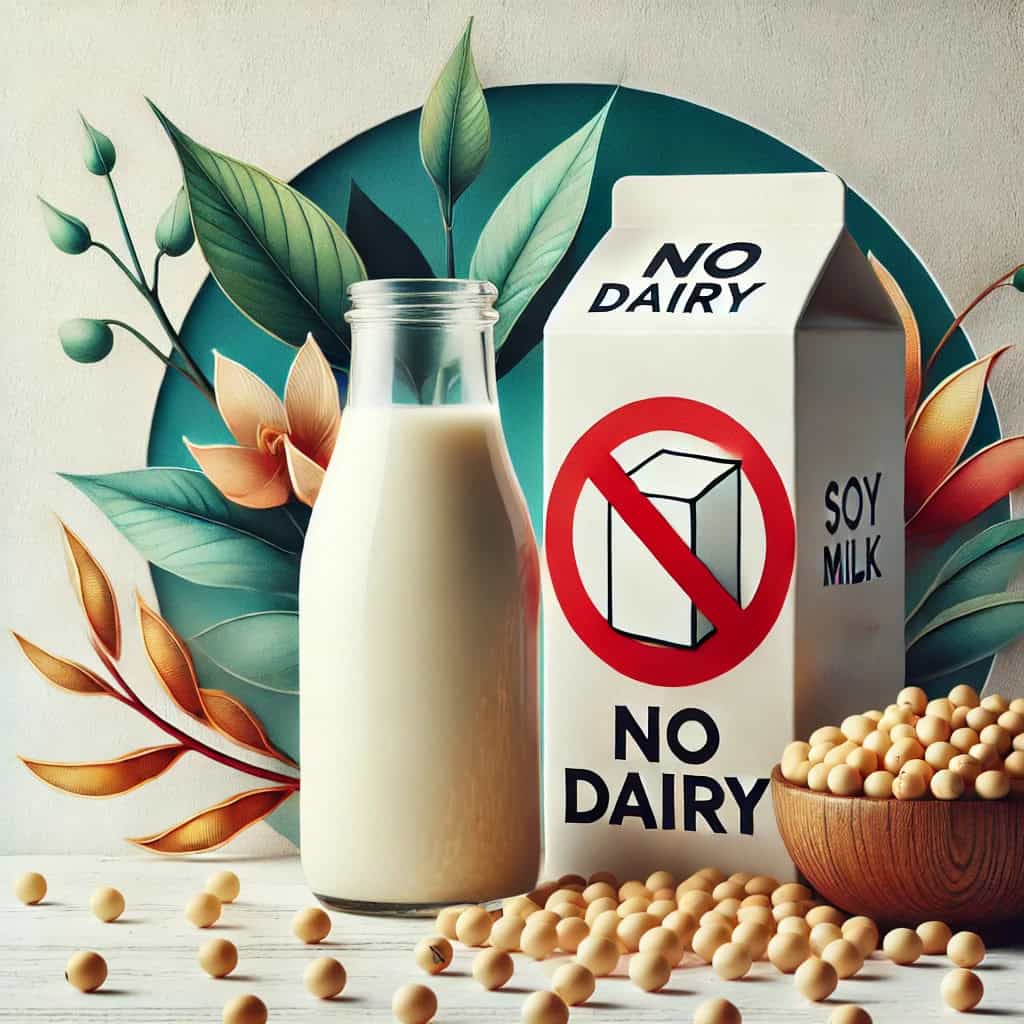
Vegan milk is simply a dairy-free alternative to regular cow’s milk. Sometimes called “plant-based” or “non-dairy,” vegan milks are typically made from soaking oats, nuts, or another plant-based ingredient in water. After soaking for a number of hours, this mixture is blended before getting strained to remove the pulp.
Why Choose Vegan Milk?
There are a number of reasons why you might choose vegan milk over dairy options. And of course, you may choose vegan milk for a different reason than your neighbor. Reasons for swapping to plant-based alternatives range from preferences to allergies.
Some common reasons why people choose vegan milk include:
- Dairy allergies
- Environmental concerns due to the carbon emissions from animal products
- Following a vegan diet or a plant-based diet
- Health reasons such as being lower in calories, fat, or sugar than dairy milk
- Free of hormones found in some cow’s milk
- Taste preference
Types of Vegan Milks
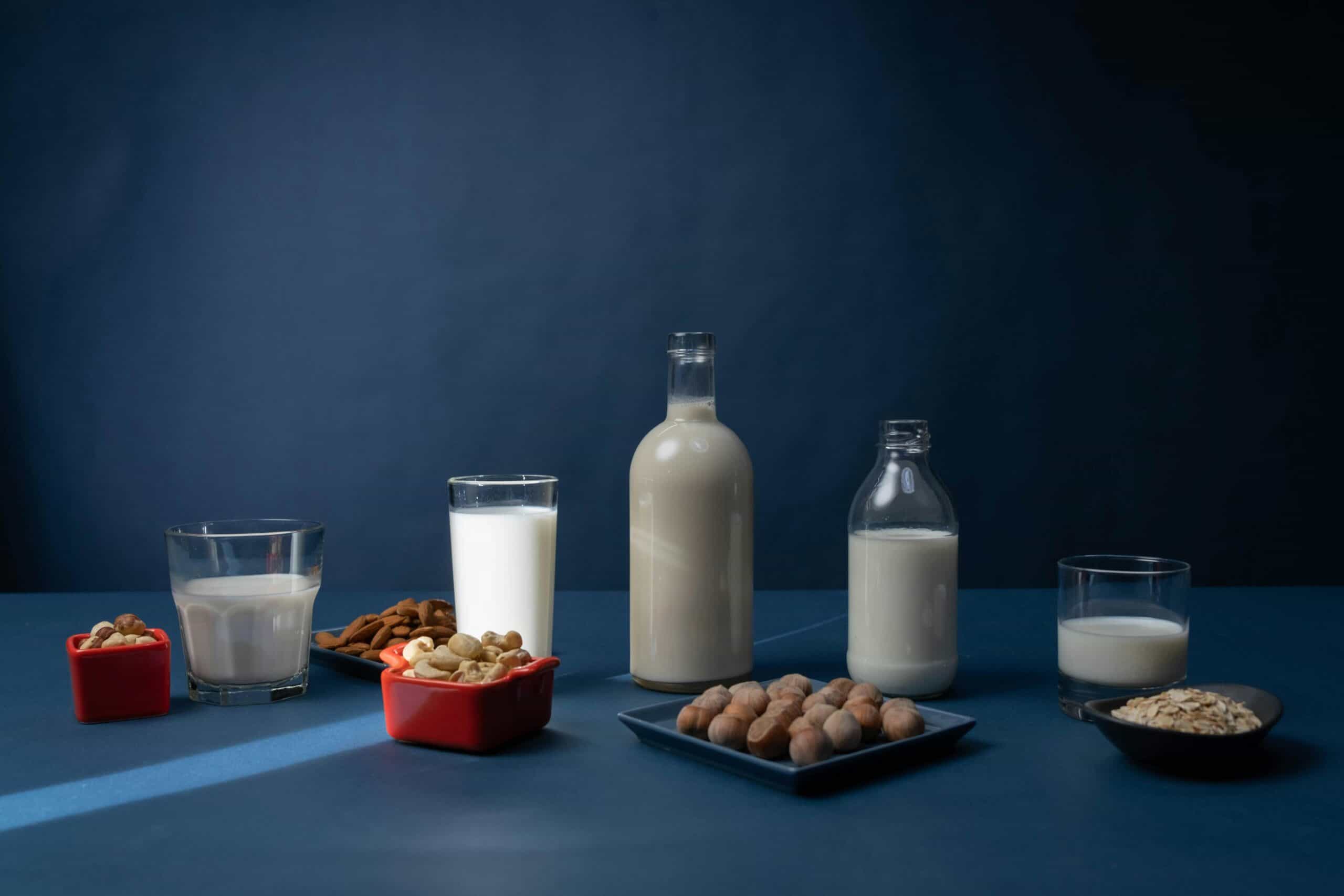
The chart below provides a brief overview of the differences between popular vegan milks. Then, learn more about them below!
| Vegan Milk | Good For | Flavor Profile | Possible Allergens | Approx. Calories Per Cup |
|---|---|---|---|---|
| Soy | Coffee creamer, frothing for lattes, topping cereal, smoothies and shakes | Smooth, creamy | Soy | 80 |
| Almond | Baking, smoothies or shakes, topping cereal | Mild, light | Nuts (almonds) | 39 |
| Oat | Coffee creamer, frothing for lattes | Rich, creamy, and slightly sweet | Gluten (unless certified gluten-free) | 110 |
| Coconut | Cooking, smoothies, coffee creamer | Rich, creamy, “coconutty” | Coconut | 75.36 |
| Rice | Smoothies and shakes | Mild with a natural sweetness | None | 115 |
Tip: Get the most out of whichever milk you choose by mixing in a scoop of Live it Up Super Greens for a delicious, nutrient-packed beverage!
Soy Milk
- Nutritional profile for one cup of unsweetened soy milk:
- Calories: 80
- Carbs: 4 g
- Sugar: 1 g
- Fat: 4 g
- Protein: 7 g
- Taste: Smooth and creamy
- Uses:
- Coffee creamer
- Frothing for lattes
- Adding to smoothies or shakes
- Topping cereal or granola
- Pros:
- High protein content, comparable to cow's milk
- Often fortified with essential nutrients
- Cons:
- Soy allergens
- Unique soy flavor
- Often includes thickening agents or added sugar
Soy milk is perhaps one of the oldest vegan milks on this list. Made from soaking soybeans in water, soy milk is high in protein, lending it well to people who want an alternative milk that is comparable to cow’s milk. What’s more? Many brands of soy milk are often fortified with essential nutrients to offer a well-rounded nutrient profile.
The biggest con to soy milk is its namesake ingredient—soy. Some may dislike the characteristic soy flavor. Often, sweetened and unsweetened soy milk contains some type of thickening agent like locust bean gum, gellan gum, or carrageenan. Although these ingredients are approved by the FDA, they may be a con for people looking to avoid additives.
Almond Milk
- Nutritional profile for one cup of unsweetened almond milk:
- Calories: 39
- Carbs: 3.4 g
- Sugar: 2 g
- Fat: 2.5 g
- Protein: 1 g
- Taste: Mild and light
- Uses:
- Baking
- Adding to smoothies or shakes
- Topping cereal or granola
- Pros:
- Low in calories
- Rich in vitamin E
- Mild flavor
- Cons:
- Low protein content
- Environmental concerns due to water usage in almond farming
Almond is another popular choice for its low-calorie content and mild flavor. Like with soy milk, it is not uncommon to find thickeners, sugars, and other additives.
True to its name, almond milk is made by soaking raw almonds in water before getting blended into a smooth, creamy alternative milk. Almonds are a natural source of vitamin E, which is why almond milk is also an excellent source of this essential vitamin. Vitamin E is essential for supporting healthy eyes and glowing skin, and almond milk is a wonderful way to ensure you’re getting this benefit-rich vitamin in your regular diet.
The biggest issue most people have with almond milk is its environmental impact. Even though almond milk produces fewer greenhouse gas emission than dairy milk or some of the other milk alternatives on this list, almond farming demands high volumes of water. Considering that most of the world’s almonds are grown in California, a state that experiences recurring droughts, the farming of almonds uses 13% of the state’s water supply.
Oat Milk
- Nutritional profile for one cup of oat milk:
- Calories: 110
- Carbs: 13 g
- Sugar: 5 g
- Fat: 5.7 g
- Protein: 1.6 g
- Taste: Rich, creamy, and slightly sweet
- Uses:
- Coffee creamer
- Frothing for lattes
- Pros:
- Best vegan milk for frothing
- Creamy texture
- Often fortified with B vitamins
- Cons:
- High in carbohydrates
- May contain added sugars
- May contain gluten unless gluten-free certified
- Expensive
Oat milk is having a moment right now thanks to its rich and creamy texture. Out of all the kinds of vegan milk on this list, oat milk is one of the best for creating delicious, dairy-free lattes and cappuccinos. Many brands of oat milk are fortified with vitamin B12, among other B vitamins, to boost their nutritional profile.
However, there are a number of cons to keep in mind when it comes to this popular option. The high price point is matched only by the high calorie, carbohydrate, and fat content of one cup of oat milk. Compared to regular dairy, the amounts found in oat milk are still less than dairy options, but it is still important to know that these levels are still some of the highest on this list.
Oat milk is not usually safe for people with gluten sensitivities or celiac disease. If you are gluten-free, always choose an oat milk that is marked with the certified gluten-free label.
Coconut Milk
- Nutritional profile for one cup of coconut milk:
- Calories: 75.6
- Carbs: 7 g
- Sugar: 6 g
- Fat: 5 g
- Protein: 0.5 g
- Taste: Rich, creamy, and “coconutty”
- Uses:
- Cooking
- Coffee creamer
- Smoothies
- Pros:
- Rich flavor
- Good for cooking
- Contains healthy fats
- Cons:
- Low in protein
- Distinct coconut flavor
- May contain thickeners or added sugars
Coconut milk is well-loved in Thai and Southeast Asian cuisine for its rich, creamy texture and distinct coconut flavor. Made from the white flesh of mature coconuts, coconut milk is naturally vegan, soy-free, nut-free, and gluten-free. This plant-based milk is a wonderful option for cooking—just add it to soups, stews, and other dishes as you would cream or regular milk.
Though coconut milk is low in protein, it is high in healthy fats. These healthy fats, specifically medium-chain triglycerides, have been linked to healthy weight management. Of course, it is important to shop around for coconut milk before just buying any can off the shelf since many brands of coconut milk may contain thickeners or added sugars.
Additionally, opt for the light coconut milk option if you’re watching your calorie intake. Full-fat coconut milk is creamier but has more fat and calories.
Rice Milk
- Nutritional profile for one cup of rice milk:
- Calories: 115
- Carbs: 22.4 g
- Sugar: 13 g
- Fat: 2 g
- Protein: 0.7 g
- Taste: Mild with a natural sweetness
- Uses:
- Smoothies and shakes
- Pros:
- Allergen-friendly
- May be fortified with vitamin D and calcium
- Safe for people with celiac disease
- Cons:
- Low in protein
- High glycemic index
Rice milk is an unfussy and reliable vegan milk option. Dating back to China in 1000 B.C.E., rice milk is simply made by soaking rice in water. Compared to regular whole milk, rice milk is slightly sweeter and lower in calories.
Additionally, most store-bought rice milk will likely be fortified with vitamin D and calcium to make them more nutritious.
It is important to know that rice milk has a high glycemic index due to its high levels of carbohydrates and sugars. Because of this, it may not be the best option for people who need to watch their sugar intake for health reasons.
Emerging Options
New plant-based milk alternatives seem to pop up every day. Some popular kinds of vegan milk that have emerged in recent years include pistachio milk, macadamia milk, cashew milk, hemp milk, and pea protein-based milk.
Pistachio milk is yet another nut-based milk, making it unsuitable for people with nut allergies. However, pistachio milk is naturally gluten-free and filled with many of the beneficial nutrients found in pistachios. Plus, pistachio milk is one of the creamiest, most luxurious-tasting milk out there, making it perfect for vegan lattes and cappuccinos.
Also of note are cashew milk, a low-calorie and super creamy option, and macadamia milk, which is rich in vitamins and healthy fats.
Pea protein-based milk is a newcomer to the alternative milk world. High in protein, low in calories, and rich in other nutrients, this is a solid milk alternative to try. However, pea milk often contains more additives than other kinds of plant-based milk, so it is recommended to keep daily intake of this milk type moderate.
Popular Vegan Milk Brands
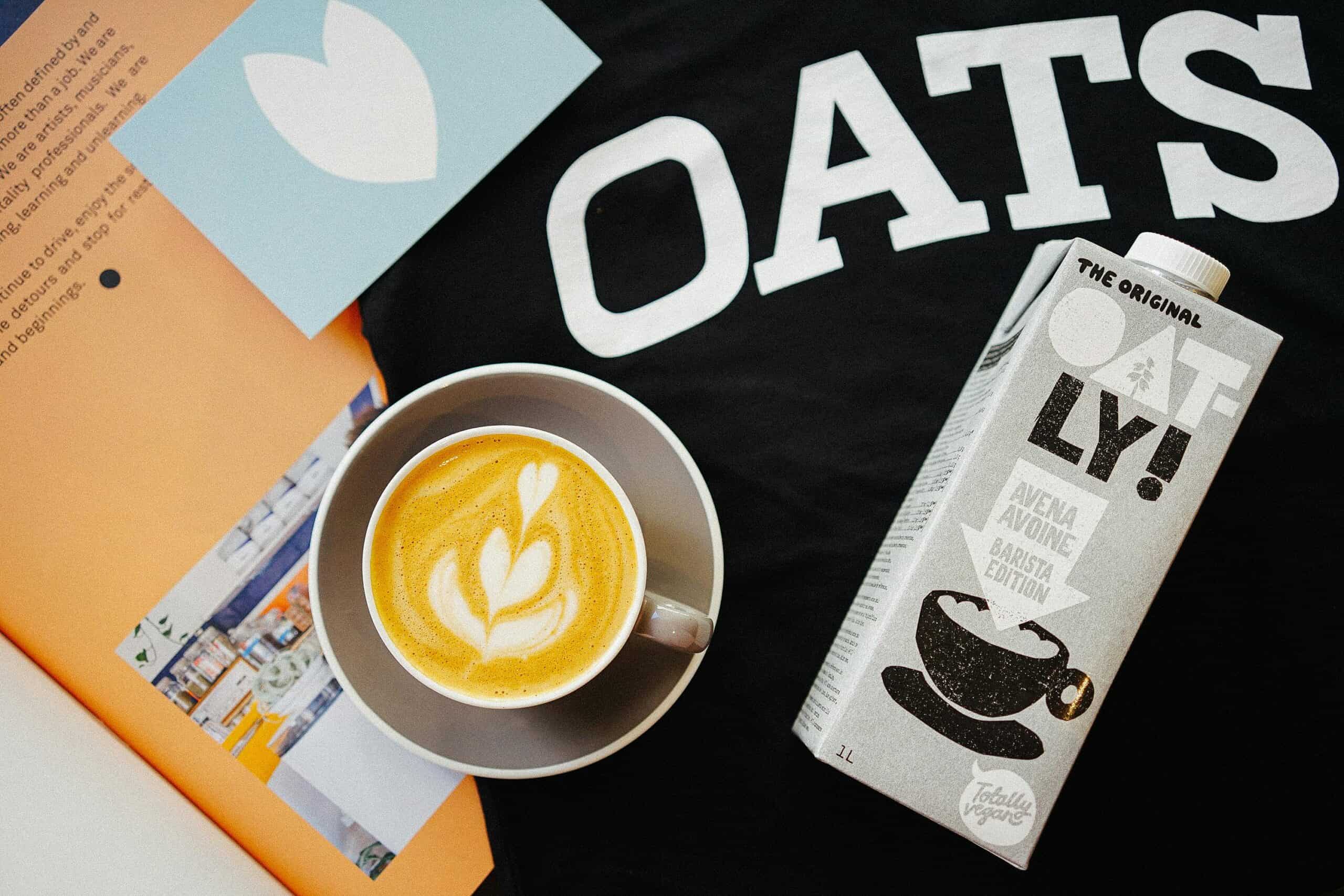
Not only are there plenty of vegan milk options to consider but there are even more vegan milk brands. Here, we’ll take a look at 5 vegan milk brands I recommend for quality, taste, and ingredients.
Elmhurst 1925
- Vegan milk options:
- Almond
- Coconut cashew
- Oat
- Walnut
- Hazelnut
- Flavor options:
- Sweetened and unsweetened vegan milk
- Chocolate oat milk
- Creative coffee creamer flavors: Sweet cream, creme brulee, cinnamon churro, maple walnut, chai, and French vanilla
- Price:
- $6 to $7 for 1-quart (32 fl oz) of unsweetened plant-based milk
- $6 for 16 fl oz creamer
What started as a dairy brand has since transformed into one of the most reliable plant-based milk producers. Elmhurst 1925 is known for its variety of high-quality vegan milks. Using minimal ingredients (their longest ingredient list includes only 6 ingredients) and recyclable cartons, most of the milk choices in Elmhurst’s lineup are well worth the high price tag (approximately $6 to $7 per 1-quart carton).
Oatly
- Vegan milk options: Oat
- Flavor options:
- Vanilla creamer
- Chocolate
- Price:
- $5.99 for 64 fl oz (half a gallon)
Oatly is a Swedish food company that has made its way into grocery stores and coffee shops with its trendy branding and desire to make oat milk the new normal. Known for its incredibly creamy oat milk, Oatly is a favorite for baristas and coffee drinkers. Plus, Oatly is widely accessible in the U.S.
The company stands out for their sustainability commitment; every part of their supply chain and production process is outlined on their website, along with their initiatives to promote environmental sustainability around the world.
Califia Farms
- Vegan milk options:
- Almond
- Coconut
- Oat
- Flavor options:
- Toasted coconut almond milk
- Unsweetened and regular vanilla almond milk
- Creamer flavors: Vanilla, French Vanilla, Brown Sugar, Lavender, Cinnamon, Caramel Macchiato, Birthday Cake, Chocolate Chip Cookie, and Toasted Hazelnut
- Price:
- $5.49 for 48 fl oz (1.5 quarts) of Extra Creamy Oatmilk
- $5.29 for 25.4 fl oz (1.5 pt) of French Vanilla Almond Creamer
Califia Farms makes delicious plant-based products. Based in California, this company got its start with the singular goal of making products that were better for the environment and equally as delicious as their animal counterparts.
Califia Farms packages their plant milk in distinct curvy bottles, adding to the joy of their products! All of their products are wonderful, creamy, and perfect for vegan diets.
Mooala
- Vegan milk options:
- Almond
- Oat
- Banana
- Flavor options:
- Vanilla Bean Almond Milk
- Bananamilk: Chocolate, strawberry, vanilla
- Price:
- $5.19 for 32 fl oz of Organic Barista Oat Creamer
Mooala’s products are the only ones on this list that are certified USDA organic, which only confirms the company’s dedication to quality. Guided by a commitment to creating alternative milks that are free of additives, fillers, and thickeners, Moola creates high-quality plant-based milks that are easy to incorporate into your routine.
Moola stands apart from the others for its unique “Bananamilk.” True to its name, this plant-based milk is made from bananas along with sunflower seeds and cinnamon. However, not all grocery stores carry this brand.
Silk
- Vegan milk options:
- Almond
- Oat
- Soy
- Cashew
- Coconut
- Flavor options:
- Chocolate
- Vanilla
- Dark chocolate (Almond Milk only)
- Protein Almond Milk
- Creamer: Cinnamon Caramel Oat Cold Foam, White Chocolate Macadamia
- Cold Foam, Vanilla Cinnamon, Vanilla, “Sweet & Creamy,” Caramel, Creme Brulee, Oatmeal Cookie, Sweet Oat Latte, Caramel Creme, Maple Brown Sugar
- Price:
- $4.49 for 64 fl oz (half a gallon) of Vanilla Almond Milk
Silk is the leader in plant-based milk. This long-established company has had milk cartons on grocery store shelves since the 90s, proving that they’re good at what they do. The brand started with soy milk and has since expanded into almond, coconut, cashew, and other plant-based dairy products. This is one of the best brands to consider for affordability and accessibility, as their products can be found in grocery stores nationwide.
Factors to Consider When Selecting Vegan Milk
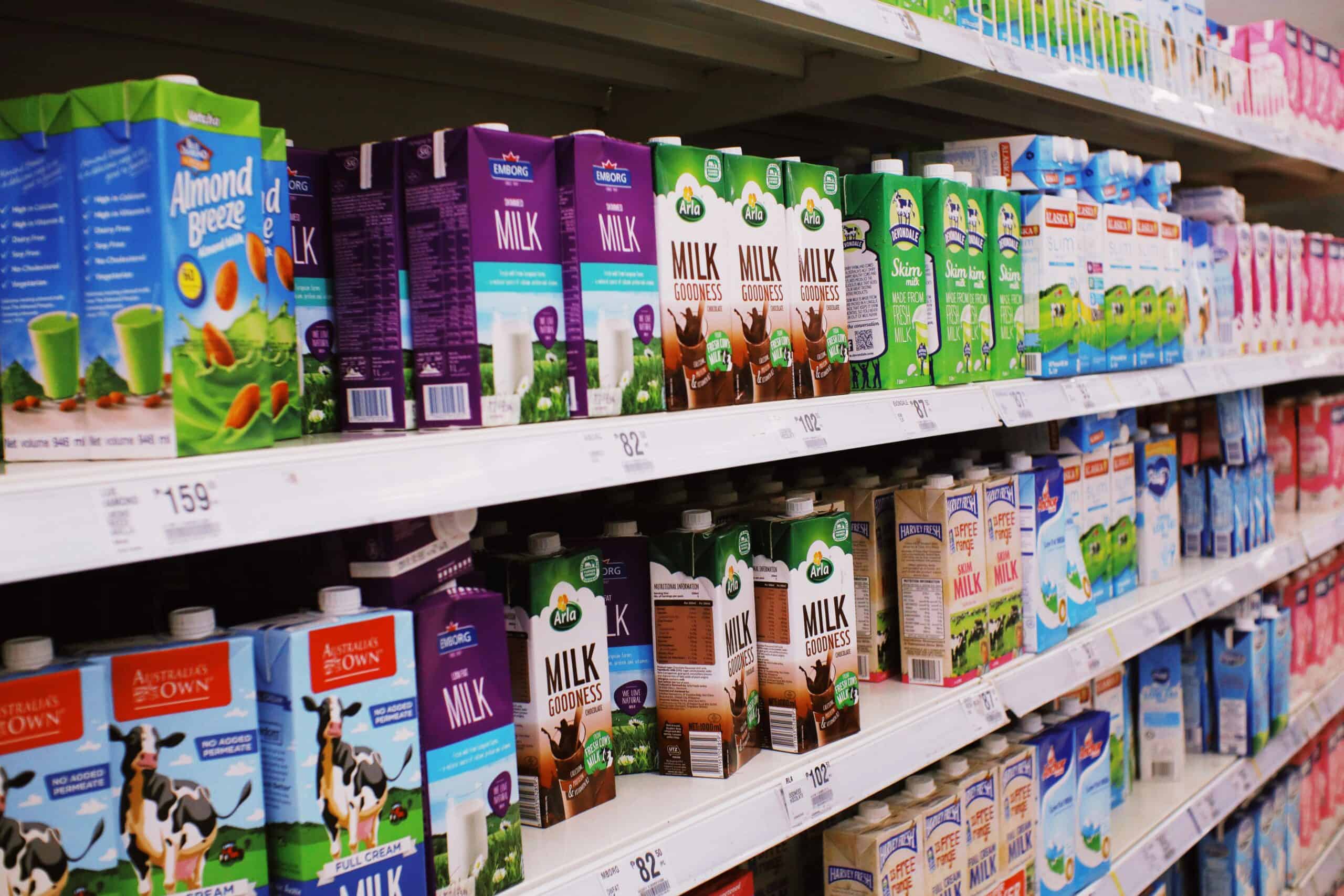
Now that you know about some of the popular milk options out there and which brands to look for, it is time to choose a plant-based milk that you love! To help you find the right vegan milk for your needs, I encourage you to consider these 5 factors: nutritional needs, dietary restrictions, intended use, taste preferences, and environmental impact.
Nutritional Needs
If you’re on a vegan diet, it is essential to consider the nutritional makeup of your daily routine. Since no two plant-based milks are made equal, it is important to carefully weigh the nutritional pros and cons of your options.
Are you looking for vegan milk with protein? Then perhaps opt for soy milk or Silk’s protein Almond milk. Do you want vegan milk that is low-calorie but still offers some vitamins and minerals? Almond milk or pea protein milk may be better suited to your needs.
Regardless of which milk you choose, I highly recommend adding Super Greens to your diet if you need help reaching your daily nutritional goals. This unique formula from Live it Up is packed with vitamins, minerals, probiotics, and other essential nutrients that you may otherwise be missing from a vegan diet.
What I love about Super Greens is that it dissolves easily in all types of plant-based milks without any unpleasant residue or chalky texture!
Dietary Restrictions
The next things to consider are allergies and intolerances. Look for a product that is free of known allergens, such as nuts, soy, or gluten. If you have been diagnosed with celiac disease, it is especially important to ensure you choose a vegan milk that is certified gluten-free to avoid cross-contamination.
Intended Use
How are you going to use plant-based milk? The intended use will be a major contributor to helping you find the vegan milk best suited to your needs and lifestyle. If you are only adding a splash of milk to your coffee or tea in the morning, then I recommend considering oat or soy milk or plant-based coffee creamers. If you want to froth the milk to make lattes and cappuccinos, then oat milk or soy milk are your best bets.
When it comes to cooking and baking, I recommend almond milk, cashew milk, or rice milk since they have milk flavors that meld easily with recipes. Coconut milk is also a fantastic option for cooking and is commonly found in Thai and Southeast Asian recipes. These options are also my preference for smoothies, shakes, overnight oats, and chia seed puddings since they’re mild, mixable, and well-suited to a variety of flavors.
If you’re looking for options simply for sipping, then the sky’s the limit! Choose the milk that has the flavor you best enjoy if you want to sip or mix it with dietary supplement powders.
The V Nutrition Editorial Team, consisting of experts in vegan nutrition and health, focuses on providing accurate and helpful information. With backgrounds in nutrition science and a shared commitment to plant-based living, we ensure that every piece of content not only educates but also empowers our readers to make informed lifestyle choices.
The V Nutrition Editorial Team, consisting of experts in vegan nutrition and health, focuses on providing accurate and helpful information. With backgrounds in nutrition science and a shared commitment to plant-based living, we ensure that every piece of content not only educates but also empowers our readers to make informed lifestyle choices.


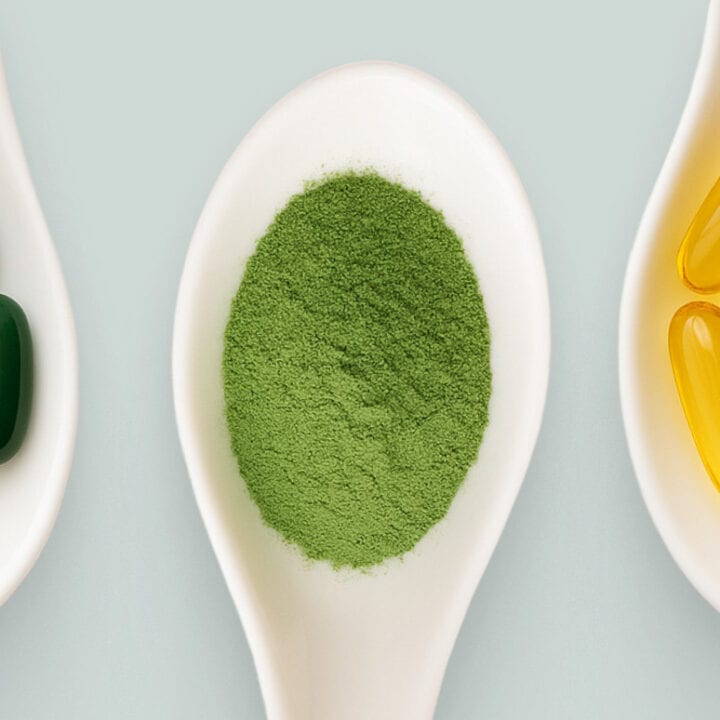
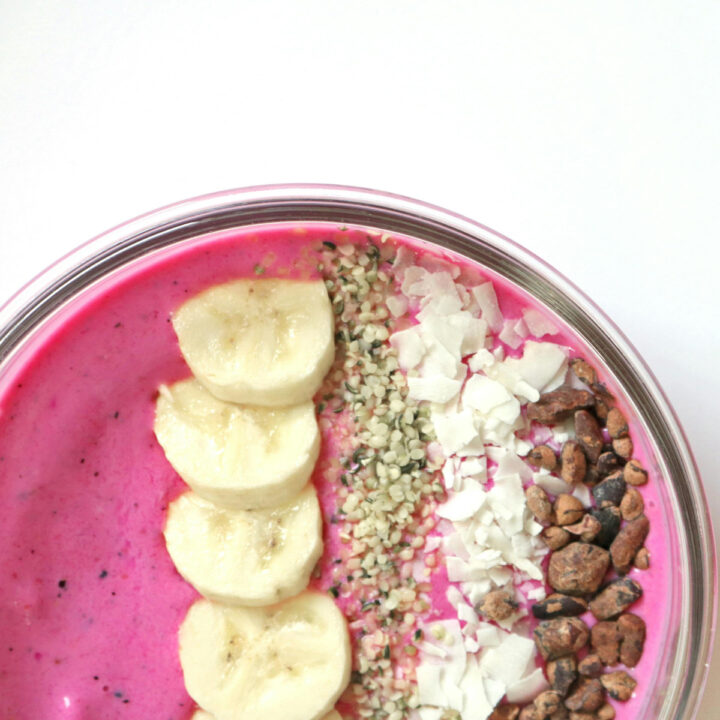
Comments
No Comments